鸦片战争英文
鸦片战争英文小结
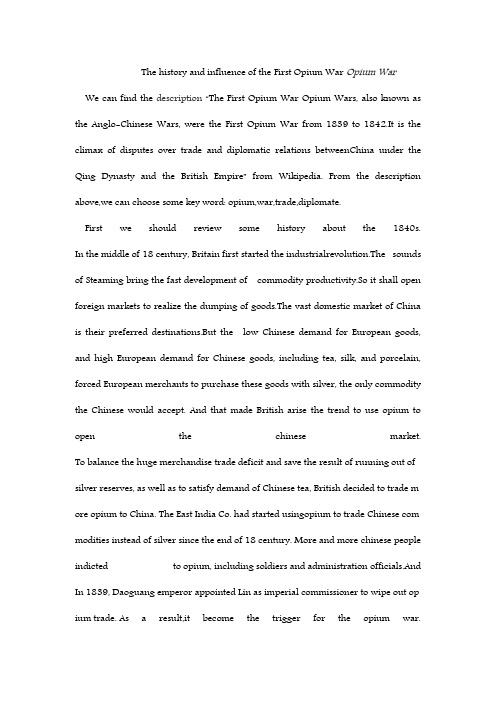
The history and influence of the First Opium War Opium WarWe can find the description “The First Opium War Opium Wars, also known as the Anglo-Chinese Wars, were the First Opium War from 1839 to 1842.It is the climax of disputes over trade and diplomatic relations betweenChina under the Qing Dynasty and the British Empire” from Wikipedia. From the description above,we can choose some key word: opium,war,trade,diplomate.First we should review some history about the 1840s. In the middle of 18 century, Britain first started the industrialrevolution.The sounds of Steaming bring the fast development of commodity productivity.So it shall open foreign markets to realize the dumping of goods.The vast domestic market of China is their preferred destinations.But the low Chinese demand for European goods, and high European demand for Chinese goods, including tea, silk, and porcelain, forced European merchants to purchase these goods with silver, the only commodity the Chinese would accept. And that made British arise the trend to use opium to open the chinese market. To balance the huge merchandise trade deficit and save the result of running out of sil ver reserves, as well as to satisfy demand of Chinese tea, British decided to trade mor e opium to China. The East India Co. had started usingopium to trade Chinese commo dities instead of silver since the end of 18 century. More and more chinese people indicted to opium, including soldiers and administration officials.And In 1839, Daoguang emperor appointed Lin as imperial commissioner to wipe out opiu m trade. As a result,it become the trigger for the opium war. In August 1842, the first Opium War was ended with disastrous defeat of China. Britis h authority forced Qing government to sign the first unequal treatyin modern history "Treaty of Nanjing "."Treaty of Nanjing "makes British get extraterritoriality and consular jurisdiction.And it becomes a worst start of modern china’s history.In addition, as we know,our customs lost our rights of administration. As far as i am concerned,Opium War is an important turning point in Chinese history. What the war bring us is not just the sadness,but the experiment that:”Delays are dangerous” .。
中国历史上的一些重大事件 major events in Chinese history

中国历史上的一些重大事件major events in Chinese history1. 秦始皇统一中国unification of the country by Emperor Qin Shi Huang秦始皇[嬴政、"千古一帝"]二十六年(前221年)灭六国[赵国、魏国、韩国、燕国、楚国、齐国],统一天下,正式建立秦朝,称"始皇帝",时年三十九岁;秦始皇统一制度、修筑长城,为中国历史做出重要贡献。
2. 鸦片战争Opium War (1840-1842)鸦片战争(Sino-British Opium War),中国近代史上一共有两次鸦片战争:第一次鸦片战争:1840年6月~1842年8月。
第二次鸦片战争:1856年10月~1860年10月。
两次鸦片战争使旧中国逐步沦为半封建半殖民地社会。
3. 太平天国Taiping Heavenly Kingdom (1851-1864)太平天国是中国清朝后期由洪秀全所建立的国家,前身为1843年之"拜上帝会"。
1851年成立太平天国,1853年建都天京,势力遍及中国十省。
至1864年天京陷落止,计存在13年。
太平天国开创了中国历史上的许多特例,以西方宗教名义组织势力,中国官方认定之"中国农民起义"且"第一次遭到中外势力共同镇压"。
而在清朝初年剃发易服之后,太平军因拒绝此俗,亦被称作长毛、发贼。
4. 戊戌变法the Reform Movement of 1898戊戌变法又名百日维新,是清朝光绪二十四年间(1898年6月11日-9月21日)的一项政治改革运动。
这次变法主张由光绪皇帝亲自领导,进行政治体制的变革,希望中国走上君主立宪的现代化道路。
无奈变法受到清朝廷内保守势力尤其是慈禧太后的反对,最后演变成为政变,维新派人物被杀。
维新运动失败,使中国损失一批热心于国家改革的精英和支持者,将中国推上革命的道路。
鸦片战争英文课件
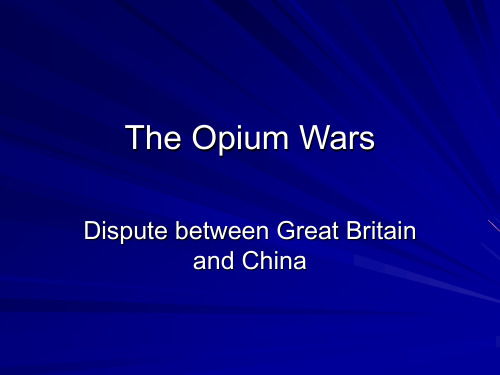
First Opium War
Lin demanded British merchants to sign a bond promising not to deal opium under penalty of death Lin disposed of the opium – dissolving it in the ocean Did not realize the impact of this action!
First Opium War
British merchants and government regarded this as destruction of private property Responded by sending warships, soldiers, and the British India Army into China June 1840 Had superior military force – attacked coastal cities, defeated Qing forces easily
– Ten more Chinese ports would be opened for foreign trade, including Niuzhuang, Danshui, Hankou and Nanjing
– The right of foreign vessels including warships to navigate freely on the Yangtze River
Treaty of Nanjing
Referred to as the Unequal Treaties – accepted 1843 China
鸦片战争历史事件介绍_鸦片战争历史事件背景
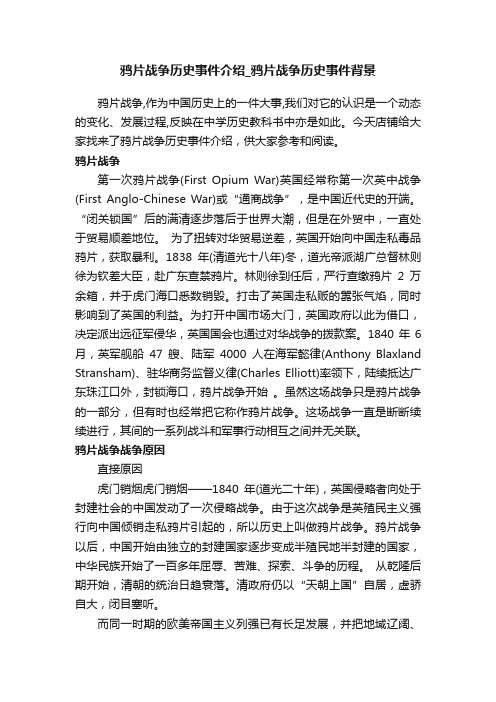
鸦片战争历史事件介绍_鸦片战争历史事件背景鸦片战争,作为中国历史上的一件大事,我们对它的认识是一个动态的变化、发展过程,反映在中学历史教科书中亦是如此。
今天店铺给大家找来了鸦片战争历史事件介绍,供大家参考和阅读。
鸦片战争第一次鸦片战争(First Opium War)英国经常称第一次英中战争(First Anglo-Chinese War)或“通商战争”,是中国近代史的开端。
“闭关锁国”后的满清逐步落后于世界大潮,但是在外贸中,一直处于贸易顺差地位。
为了扭转对华贸易逆差,英国开始向中国走私毒品鸦片,获取暴利。
1838年(清道光十八年)冬,道光帝派湖广总督林则徐为钦差大臣,赴广东查禁鸦片。
林则徐到任后,严行查缴鸦片2万余箱,并于虎门海口悉数销毁。
打击了英国走私贩的嚣张气焰,同时影响到了英国的利益。
为打开中国市场大门,英国政府以此为借口,决定派出远征军侵华,英国国会也通过对华战争的拨款案。
1840年6月,英军舰船47艘、陆军4000人在海军懿律(Anthony Blaxland Stransham)、驻华商务监督义律(Charles Elliott)率领下,陆续抵达广东珠江口外,封锁海口,鸦片战争开始。
虽然这场战争只是鸦片战争的一部分,但有时也经常把它称作鸦片战争。
这场战争一直是断断续续进行,其间的一系列战斗和军事行动相互之间并无关联。
鸦片战争战争原因直接原因虎门销烟虎门销烟——1840年(道光二十年),英国侵略者向处于封建社会的中国发动了一次侵略战争。
由于这次战争是英殖民主义强行向中国倾销走私鸦片引起的,所以历史上叫做鸦片战争。
鸦片战争以后,中国开始由独立的封建国家逐步变成半殖民地半封建的国家,中华民族开始了一百多年屈辱、苦难、探索、斗争的历程。
从乾隆后期开始,清朝的统治日趋衰落。
清政府仍以“天朝上国”自居,虚骄自大,闭目塞听。
而同一时期的欧美帝国主义列强已有长足发展,并把地域辽阔、人口众多的中国,作为他们扩大海外市场的目标。
关于鸦片战争的英语作文
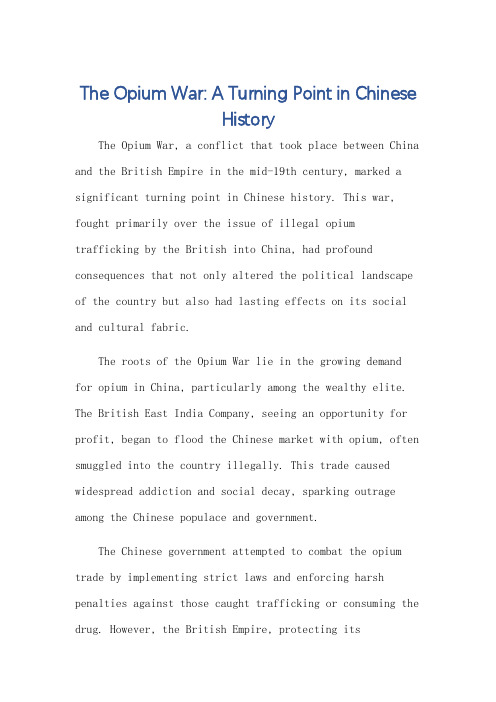
The Opium War: A Turning Point in ChineseHistoryThe Opium War, a conflict that took place between China and the British Empire in the mid-19th century, marked a significant turning point in Chinese history. This war, fought primarily over the issue of illegal opiumtrafficking by the British into China, had profound consequences that not only altered the political landscape of the country but also had lasting effects on its social and cultural fabric.The roots of the Opium War lie in the growing demandfor opium in China, particularly among the wealthy elite. The British East India Company, seeing an opportunity for profit, began to flood the Chinese market with opium, often smuggled into the country illegally. This trade caused widespread addiction and social decay, sparking outrage among the Chinese populace and government.The Chinese government attempted to combat the opium trade by implementing strict laws and enforcing harsh penalties against those caught trafficking or consuming the drug. However, the British Empire, protecting itscommercial interests, refused to cooperate and instead pressed for the legalization of opium trade. This led to a series of diplomatic disputes and escalating tensions between the two powers.In 1840, the British Empire launched a military expedition against China, citing the Chinese government's failure to suppress the opium trade as justification. The Chinese army, despite its numerical advantage, was no match for the superior firepower and military technology of the British forces. The resulting series of battles ended in decisive victories for the British, who forced the Chinese government to sign the Treaty of Nanking.The Treaty of Nanking was a humiliating defeat for China. It stripped the country of its territorial integrity, ceding the strategic Hong Kong Island to the British, and imposed heavy indemnities on the Chinese government. Moreover, it opened several Chinese ports to foreign trade and established extraterritoriality for British subjects in China, effectively denying the Chinese governmentjurisdiction over British citizens within its borders.The Opium War had profound long-term consequences for China. It marked the beginning of a period of foreign influence and interference in Chinese affairs that lasted for decades. The treaty system established by the Opium War opened China's door to Western influence, leading to the influx of foreign goods, ideas, and culture. This, in turn, led to the gradual weakening of traditional Chinese institutions and values.Moreover, the Opium War exposed the technological and military backwardness of the Qing dynasty, sparking a movement for reform and modernization within China. This ultimately led to the establishment of modern industries, the development of a modern army and navy, and the emergence of a more educated and politically aware citizenry.In conclusion, the Opium War stands as a pivotal event in Chinese history. It marked the end of China's isolation from the outside world and the beginning of a period of foreign domination and influence. However, it also served as a catalyst for reform and modernization within China,leading to significant changes in its political, economic, and cultural landscapes.**鸦片战争:中国历史的转折点**鸦片战争是19世纪中叶中国与大英帝国之间爆发的一场冲突,标志着中国历史的重大转折点。
第二次鸦片战争作文
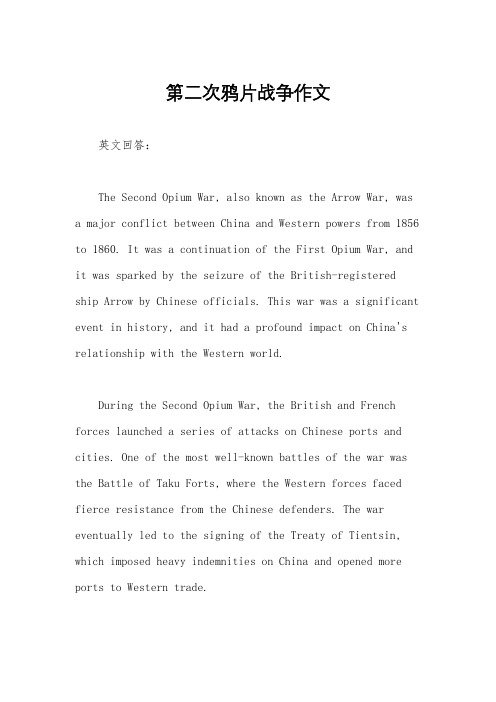
第二次鸦片战争作文英文回答:The Second Opium War, also known as the Arrow War, was a major conflict between China and Western powers from 1856 to 1860. It was a continuation of the First Opium War, and it was sparked by the seizure of the British-registered ship Arrow by Chinese officials. This war was a significant event in history, and it had a profound impact on China's relationship with the Western world.During the Second Opium War, the British and French forces launched a series of attacks on Chinese ports and cities. One of the most well-known battles of the war was the Battle of Taku Forts, where the Western forces faced fierce resistance from the Chinese defenders. The war eventually led to the signing of the Treaty of Tientsin, which imposed heavy indemnities on China and opened more ports to Western trade.The Second Opium War also had a lasting impact on the Chinese society and economy. The defeat in the war further weakened the Qing dynasty and exposed the vulnerabilities of the Chinese military. It also led to the widespread destruction of Chinese infrastructure and the loss of many lives. Additionally, the unequal treaties signed after the war imposed harsh terms on China, leading to further exploitation by Western powers.中文回答:第二次鸦片战争,又称为“箭战”,是从1856年到1860年中国和西方列强之间的一场重大冲突。
描述鸦片战争英文介绍作文

描述鸦片战争英文介绍作文英文,The Opium War, also known as the First Opium War, was a conflict between China and Great Britain from 1839 to 1842. As a result of the war, China ceded the island of Hong Kong to the British and opened up five ports toforeign trade. The war was primarily caused by the British trade of opium to China, which was illegal but highly profitable. 。
The British had been trading opium in China for many years, despite the Chinese government's attempts to ban the drug. The trade imbalance caused by the opium trade led to a shortage of silver in China, as the Chinese were using silver to pay for the opium. This imbalance angered the Chinese government and led to the destruction of British opium stocks in 1839, sparking the conflict.The war itself was fought primarily at sea, with the British navy easily overpowering the Chinese forces. The Treaty of Nanking, signed in 1842, marked the end of thewar and imposed a series of unequal treaties on China. These treaties not only forced China to cede Hong Kong to the British, but also opened up several other ports to British trade and granted extraterritorial rights toBritish citizens in China.The Opium War had a profound impact on China, leading to a period of humiliation and weakness known as the "Century of Humiliation." It also marked the beginning of a series of unequal treaties and foreign interventions in China, which would continue for over a century.中文,鸦片战争,也称第一次鸦片战争,是中国和英国在1839年至1842年之间的一场冲突。
The Opium Wars鸦片战争
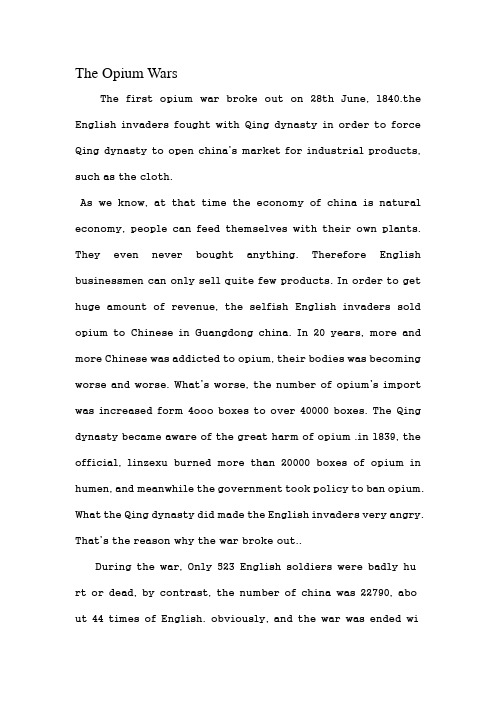
The Opium WarsThe first opium war broke out on 28th June, 1840.the English invaders fought with Qing dynasty in order to force Qing dynasty to open china’s market for industrial products, such as the cloth.As we know, at that time the economy of china is natural economy, people can feed themselves with their own plants. They even never bought anything. Therefore English businessmen can only sell quite few products. In order to get huge amount of revenue, the selfish English invaders sold opium to Chinese in Guangdong china. In 20 years, more and more Chinese was addicted to opium, their bodies was becoming worse and worse. What’s worse, the number of opium’s import was increased form 4ooo boxes to over 40000 boxes. The Qing dynasty became aware of the great harm of opium .in 1839, the official, linzexu burned more than 20000 boxes of opium in humen, and meanwhile the government took policy to ban opium. What the Qing dynasty did made the English invaders very angry. That’s the reason why the war broke out..During the war, Only 523 English soldiers were badly hurt or dead, by contrast, the number of china was 22790, abo ut 44 times of English. obviously, and the war was ended with Qing’s failure and the treaty of Nanjing, which is the fir st unequal treaty of china.The treaty of Nanjing included that Qing dynasty gave t he island of Hong Kong to England and open the five ports of Guangzhou, Xiamen, Fuzhou, Ningbo, shanghai for commer ce to England. There were many another unequal issues in t he treaty of Nanjing,.Form then on, china became a Semi-colonial and semi-f eudal society. In short, the opium war was the begin of chi na’s modern history.。
鸦片战争英文作文
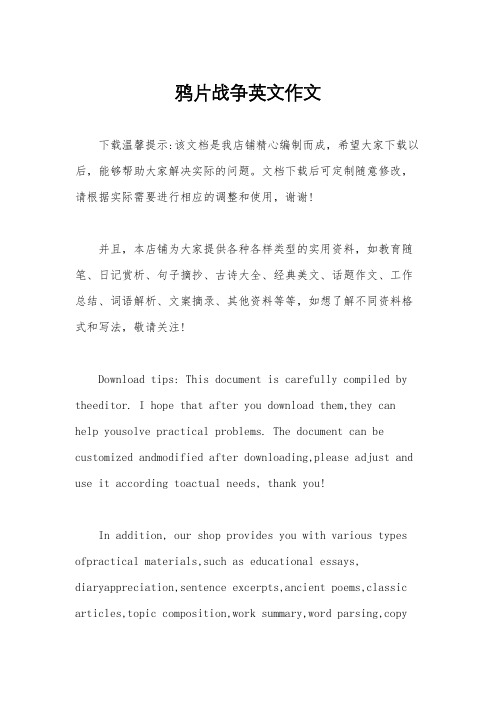
鸦片战争英文作文下载温馨提示:该文档是我店铺精心编制而成,希望大家下载以后,能够帮助大家解决实际的问题。
文档下载后可定制随意修改,请根据实际需要进行相应的调整和使用,谢谢!并且,本店铺为大家提供各种各样类型的实用资料,如教育随笔、日记赏析、句子摘抄、古诗大全、经典美文、话题作文、工作总结、词语解析、文案摘录、其他资料等等,如想了解不同资料格式和写法,敬请关注!Download tips: This document is carefully compiled by theeditor. I hope that after you download them,they can help yousolve practical problems. The document can be customized andmodified after downloading,please adjust and use it according toactual needs, thank you!In addition, our shop provides you with various types ofpractical materials,such as educational essays, diaryappreciation,sentence excerpts,ancient poems,classic articles,topic composition,work summary,word parsing,copyexcerpts,other materials and so on,want to know different data formats andwriting methods,please pay attention!The Opium War was a really bad time for China. A lot of bad stuff happened.The British came and forced opium on us. It was so wrong.Many people suffered because of this war. Families were torn apart.It had a huge impact on China's history. We should never forget this.The war changed everything. It made China face many challenges.We have to learn from this and make sure it never happens again.。
The Opium War(鸦片战争)

Events20,000 chests of Opium seized by ChineseBattle at ChinkiangBritish and American sailors kill a chinaman British capture Bogue fortsBritish expelled and travelled to Hong Kong British occupiedheights overlooking Canton British refuse to give up culprit Chinese defeated at Ningpo and Chinhai Chinese Emperor attempts to stamp out OpiumConvention of CheunpiFailure of Chinese counter-offensiveFirst Opium WarHMS Hyacinth and Volage repell 29 war junks Shanghai was occupied without a fightThe Treaty of NankingThe Opium WarEarly in the 19th cent, British merchants began smuggling opium into China in order to balance their purchases of tea for export to Britain.The Opium War, also called the Anglo-Chinese War, was the most humiliating defeat China ever suffered. 1839–42 and 1856–60, two wars between China and Western countries.The first was between Great Britain and China. In 1839, China enforced its prohibitions on the importation of opium by destroying at Guangzhou (Canton) a large quantity of opium confiscated from British merchants. Great Britain, which had been looking to end China's restrictions on foreign trade, responded by sending gunboats to attack several Chinese coastal cities. China, unable to withstand modern arms, was defeated and forced to sign the Treaty of Nanjing (1842) . These provided that the ports of Guangzhou, Jinmen, Fuzhou, Ningbo, and Shanghai should be open to British trade and residence; in addition Hong Kong was ceded to the British.In 1856 a second war broke out following an allegedly illegal Chinese search of a British-registered ship, the Arrow,in Guangzhou. British and French troops took Guangzhou and Tianjin and compelled the Chinese to accept the treaties of Tianjin (1858), to which France, Russia, and the United States were also party.Lin Tse-hsDeeply concerned about the opium menace, Lin Tse-hs maneuverd himself into being appointed Imperial Commissioner at Canton to cut off the opium trade at its source by rooting out corrupt officials and cracking down on British trade in the drug. There was a sensational event commonded by him: Burning of Opium Stocks in Humen(beach).Of all the imperial officials, however, Lin was the first to realize the momentuous lesson of the Opium War. He was called the first person who opened eyes to see the world in Chinese history. On the website,there is a Memorial Hall of Lin Tse-hs.We can send flowers to him on the website. His famous saying is:苟利国家生死以,起因祸福必趋之。
鸦片战争[英文]
![鸦片战争[英文]](https://img.taocdn.com/s3/m/9d28af2a87c24028915fc3bb.png)
2nd opium war in 1856
lasted for two years and ended with the humiliating Treaty of Tientsin
~ legalized opium in China
Conclusions…
1.) Fall of the last Chinese dynasty and the rise of the Communist party 2.) China is broken into different spheres of influence 3.) Boxer Rebellion and Taiping Rebellion –attempts to rid China of foreign dominance 4.) By 1906, China was producing 35,000 tons of opium per year; 76% of global opium production
Opium Wars: Great Britain vs. China
What caused the Wars?
Early 17th century England was rapidly growing a taste for tea which was imported from China
England however had nothing to trade with China
China’s Response
The Chinese dynasty was against opium consumption and had made it illegal to possess since 1729
鸦片战争PPT
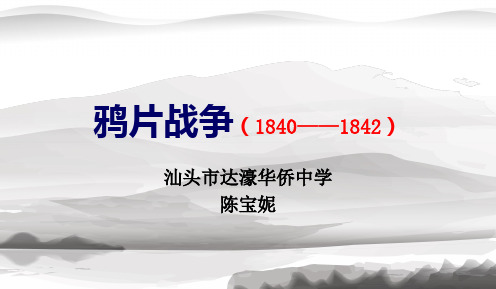
冲击:鸦片战争
反应:
1、经济:小农经济开始瓦解,被迫卷入资本主义世 界市场,(列强侵华以商品输出为主) 2、政治:各地农民起义 3、思想:林则徐、魏源等人提出的“开眼看世界”、 “师夷长技以制夷”
A、历史观点和历史结论
B历、史历事史实是观指点对和历历史史人解物释或事件的客观叙述,不带任何功能性 C(、或历作史用)叙定述位和,历即史“解是释什么”的问题。 D历、史历解史释必解须释对和历历史史人结物论或事件作出主要的较准确的功能性定
位,即“有什么用”的问题。
历史观点不仅要对历史人物或事件做出准确的功能性定位及定 性,更带有强烈的主观评判色彩,即“是什么性质,有何积极 和消极影响”的问题
1894年前
16.02
8.23(51.94%) 7.7(48.06%)
A.中国茶叶发展仍然非常缓慢 B.中国茶叶生产已经普遍使用机器生产 C.茶叶成为近代中国最主要的出口商品 D.中国茶叶业对世界市场的依赖逐渐增强
【解析】根据茶叶总销售量变化可知茶叶发展速度非常快,故A项错误;材料无法看出茶叶生产是否普遍使用机 器,故B项错误;仅有茶叶出口情况无法得出茶叶成为近代中国最主要的出口商品,故C项错误;从茶叶销售情况 看,出口量所占比重逐渐增大,到1894年时出口比重已超过内销,反映出茶叶业对世界市场的依赖逐渐增强,故 D项正确。
• ——2012年12月16日第一届凤凰财经峰会上厉以宁《十八大后的十年》的演讲
鸦片战争前中英两国对比:
中国
英国
经济 小农经济为主导,出现资本
主义萌芽,商品经济的发展
仍受到重农抑商、闭关锁国
等政策的影响。
工业革命提高了社会生产力, 在自由主义思想的指导下, 积极扩展海外市场,18世纪 下半叶,确立海上霸权。
第二次鸦片战争 英文书籍
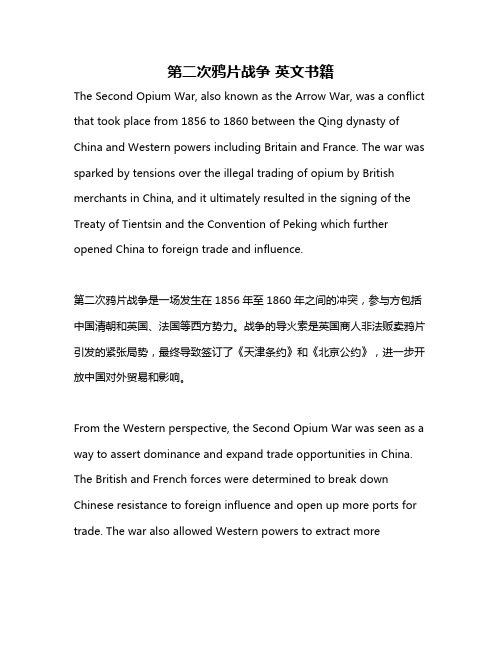
第二次鸦片战争英文书籍The Second Opium War, also known as the Arrow War, was a conflict that took place from 1856 to 1860 between the Qing dynasty of China and Western powers including Britain and France. The war was sparked by tensions over the illegal trading of opium by British merchants in China, and it ultimately resulted in the signing of the Treaty of Tientsin and the Convention of Peking which further opened China to foreign trade and influence.第二次鸦片战争是一场发生在1856年至1860年之间的冲突,参与方包括中国清朝和英国、法国等西方势力。
战争的导火索是英国商人非法贩卖鸦片引发的紧张局势,最终导致签订了《天津条约》和《北京公约》,进一步开放中国对外贸易和影响。
From the Western perspective, the Second Opium War was seen as a way to assert dominance and expand trade opportunities in China. The British and French forces were determined to break down Chinese resistance to foreign influence and open up more ports for trade. The war also allowed Western powers to extract moreconcessions from the weakened Qing dynasty, further advancing their economic and political interests in China.从西方的角度来看,第二次鸦片战争被视为一种维护统治地位并扩大在中国贸易机会的手段。
关于鸦片战争的英语作文
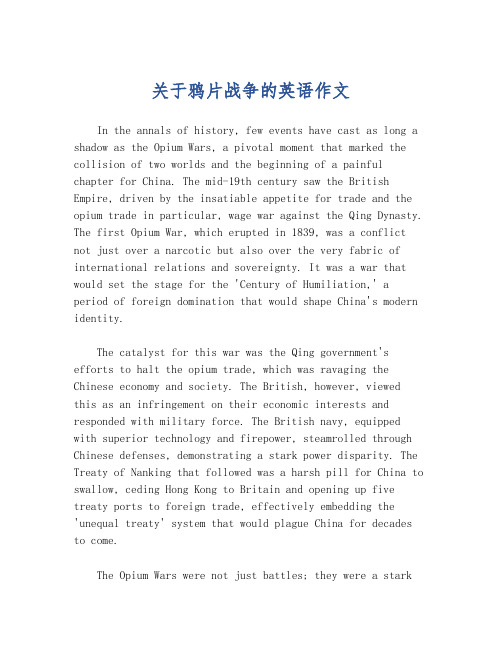
关于鸦片战争的英语作文In the annals of history, few events have cast as long a shadow as the Opium Wars, a pivotal moment that marked the collision of two worlds and the beginning of a painful chapter for China. The mid-19th century saw the British Empire, driven by the insatiable appetite for trade and the opium trade in particular, wage war against the Qing Dynasty. The first Opium War, which erupted in 1839, was a conflict not just over a narcotic but also over the very fabric of international relations and sovereignty. It was a war that would set the stage for the 'Century of Humiliation,' a period of foreign domination that would shape China's modern identity.The catalyst for this war was the Qing government's efforts to halt the opium trade, which was ravaging the Chinese economy and society. The British, however, viewedthis as an infringement on their economic interests and responded with military force. The British navy, equipped with superior technology and firepower, steamrolled through Chinese defenses, demonstrating a stark power disparity. The Treaty of Nanking that followed was a harsh pill for China to swallow, ceding Hong Kong to Britain and opening up five treaty ports to foreign trade, effectively embedding the'unequal treaty' system that would plague China for decades to come.The Opium Wars were not just battles; they were a starkreminder of the consequences of the global power dynamics and the imperative for nations to modernize. For China, it was a wake-up call to the urgent need for reform and the dangers of isolationism. The wars sparked a period of introspection and resistance, leading to the rise of various movements aimed at strengthening China against foreign encroachment.The legacy of the Opium Wars is complex and multifaceted. It represents a dark period of exploitation but also a catalyst for change. It is a testament to the resilience of the Chinese people and their enduring spirit in the face of adversity. As we reflect on this historical episode, it serves as a poignant reminder of the interconnectedness of our world and the enduring quest for justice and equality in international relations.。
西安事变和第一次鸦片战争【英文】
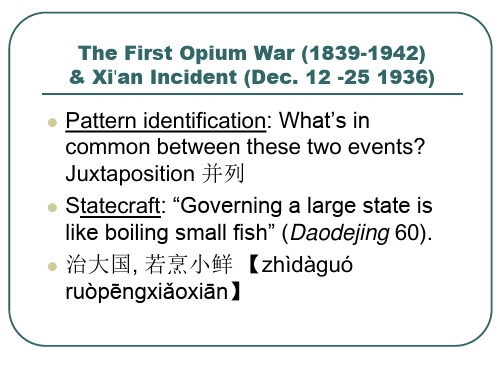
Pattern identification: What‘s in common between these two events? Juxtaposition 并列 Statecraft: ―Governing a large state is like boiling small fish‖ (Daodejing 60). 治大国, 若烹小鲜 【zhì dàguó ruòpēngxiǎoxiān】
Ethnocentrism
ቤተ መጻሕፍቲ ባይዱ
1. Sociology . the belief in the inherent superiority of one‗s own ethnic group or culture. 民族优越感 2. a tendency to view alien groups or cultures from the perspective of one's own. 我族中心 主义 本族中心主义 中国【Zhōngguó】 China—the central kingdom—from whose point of view? 远东【yuǎndōng】 the Far East—from whose point of view?
Internal struggle against eunuchs—Wei Zhongxian 魏忠贤; Role of Wu Sangui 吴三桂: 引狼入室【 yǐnlángrùshì】 invite a wolf into a house. Catalyst 催化剂 Ebrey 224-225
鸦片战争英语作文
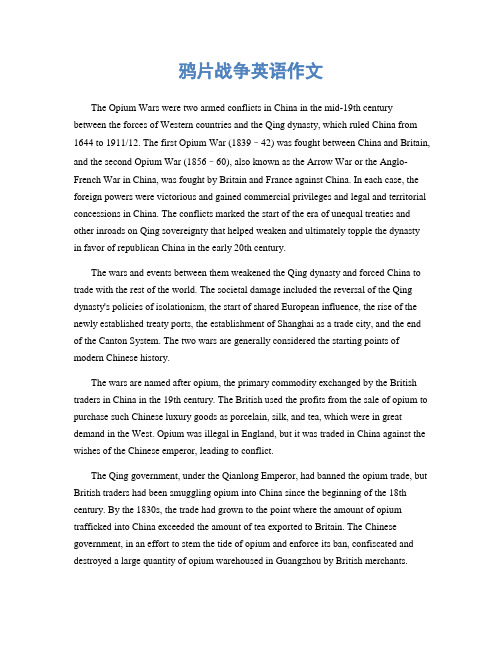
鸦片战争英语作文The Opium Wars were two armed conflicts in China in the mid-19th century between the forces of Western countries and the Qing dynasty, which ruled China from 1644 to 1911/12. The first Opium War (1839–42) was fought between China and Britain, and the second Opium War (1856–60), also known as the Arrow War or the Anglo-French War in China, was fought by Britain and France against China. In each case, the foreign powers were victorious and gained commercial privileges and legal and territorial concessions in China. The conflicts marked the start of the era of unequal treaties and other inroads on Qing sovereignty that helped weaken and ultimately topple the dynasty in favor of republican China in the early 20th century.The wars and events between them weakened the Qing dynasty and forced China to trade with the rest of the world. The societal damage included the reversal of the Qing dynasty's policies of isolationism, the start of shared European influence, the rise of the newly established treaty ports, the establishment of Shanghai as a trade city, and the end of the Canton System. The two wars are generally considered the starting points of modern Chinese history.The wars are named after opium, the primary commodity exchanged by the British traders in China in the 19th century. The British used the profits from the sale of opium to purchase such Chinese luxury goods as porcelain, silk, and tea, which were in great demand in the West. Opium was illegal in England, but it was traded in China against the wishes of the Chinese emperor, leading to conflict.The Qing government, under the Qianlong Emperor, had banned the opium trade, but British traders had been smuggling opium into China since the beginning of the 18th century. By the 1830s, the trade had grown to the point where the amount of opium trafficked into China exceeded the amount of tea exported to Britain. The Chinese government, in an effort to stem the tide of opium and enforce its ban, confiscated and destroyed a large quantity of opium warehoused in Guangzhou by British merchants.The destruction of the opium by the Chinese authorities in Guangzhou prompted Britain to act to protect its illegal drug-smuggling operations, its merchants' profits, and its own economic interests. In 1839, the First Opium War broke out. The Chinese military, which was significantly outdated, was no match for the British forces. The war ended in 1842 with the signing of the Treaty of Nanking, which included provisions for the opening of five treaty ports at Shanghai, Canton, Ningpo, Foochow, and Amoy; the cession of Hong Kong Island to Britain; and the payment of a large indemnity to Britain.The Second Opium War saw the Chinese government again attempt to enforce its sovereignty and curb the opium trade. However, the British and French forces, now allied against China, were once again victorious. The war ended with the Treaty of Tientsin in 1860, which opened more Chinese ports to foreign trade, allowed foreign missionaries to reside in China, and legalized the importation of opium.The Opium Wars had profound effects on China. They demonstrated the military superiority of the Western powers, led to the imposition of the first of the unequal treaties, and signaled the beginning of a long period of Western influence in China. The wars also had significant impacts on the British Empire; the acquisition of Hong Kong, for example, provided Britain with a valuable base from which to expand its trade with China.In conclusion, the Opium Wars were a significant turning point in Chinese history. They exposed the weaknesses of the Qing dynasty, led to increased Western influence in China, and opened the country to international trade. The wars also had lasting effects on the global balance of power and the economy of the British Empire. The legacy of the Opium Wars continues to influence China's foreign relations and its view of its own past.。
第一次鸦片战争 高清图片
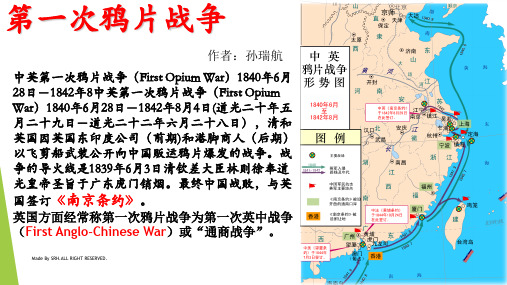
第二阶段
道光帝认为英国提出的条件过于苛刻以及琦善与 英人擅自签订条约有损天朝威严,使道光帝大为 不满,道光帝便把琦善抄家革职,派奕山、隆文 和杨芳赴广东指挥作战。但义律先下手为强,于 1841年2月23日进攻虎门炮台,虽然广东水师提 督关天培率靖远炮台将士奋力抵抗[9],但仍不敌 英军,虎门炮台最终失陷。5月21日,奕山令水陆 军1700余人,于黑夜分乘快船出动,挈火箭、喷 筒,夜袭英船,掷火焚烧。次日早晨英军2400人 反攻,清军溃退。四天之内,广州附近要地全失, 18000多清军尽退城内,秩序大乱,奕山竖起白 旗求和[8],签订《广州和约》,不但率部撤离了 广州,还勒索广州商家向英军支付了600万银元的 赎城费。英军收钱后也撤出广州。期间广州民间 反英气氛炽热,发生了三元里抗英事件。而奕山 为了不被皇帝惩罚,便虚报战功,甚至将该战役 Made By SRH.ALL RIGHT RESERVED.
第一次鸦片战争
作者:孙瑞航
中英第一次鸦片战争(First Opium War)1840年6月 28日-1842年8中英第一次鸦片战争(First Opium War)1840年6月28日-1842年8月4日(道光二十年五 月二十九日-道光二十二年六月二十八日),清和 英国因英国东印度公司(前期)和港脚商人(后期) 以飞剪船武装公开向中国贩运鸦片爆发的战争。战 争的导火线是1839年6月3日清钦差大臣林则徐奉道 光皇帝圣旨于广东虎门销烟。最终中国战败,与英
国签订《南京条约》。
英国方面经常称第一次鸦片战争为第一次英中战争 (First Anglo-Chinese War)或“通商战争”。。
Madeቤተ መጻሕፍቲ ባይዱBy SRH.ALL RIGHT RESERVED.
目录
- 1、下载文档前请自行甄别文档内容的完整性,平台不提供额外的编辑、内容补充、找答案等附加服务。
- 2、"仅部分预览"的文档,不可在线预览部分如存在完整性等问题,可反馈申请退款(可完整预览的文档不适用该条件!)。
- 3、如文档侵犯您的权益,请联系客服反馈,我们会尽快为您处理(人工客服工作时间:9:00-18:30)。
End of the War
British took Canton and sailed up the Yangtze River Took Tax Barges, cut revenue of imperial court of Beijing 1842 Qing sued for peace Ended with Treaty of Nanjing
First Opium War
Lin demanded British merchants to sign a bond promising not to deal opium under penalty of death Lin disposed of the opium – dissolving it in the ocean Did not realize the impact of this action!
Napier Affair
Lord Napier tried to circumvent the Canton Trade laws to reinstitute East India’s monopoly Governor of Macao closed trade with Britain September 2, 1834 British resumed trade under old restrictions
English East India Company
Held monopoly on production and export of opium in India Peasant cultivators often coerced and paid in advance for cultivation of poppies Sold in Calcutta for a profit of 400%
Treaty of Nanjing
Great Britain received
First Opium War 1834 - 1843
1838 Chinese instituted death penalty for native traffickers of opium March 1839 – new commissioner to control opium trade – Lin Zexu Lin imposed embargo on Britain unless they permanently ended the trade trade
Treaty of Nanjing
Referred to as the Unequal Treaties – accepted 1843 China
– Ceded Hong Kong to the British – Opened ports to British – Canton, Amoy,
Fuzhou, Ningbo, Shanghai
Fቤተ መጻሕፍቲ ባይዱrst Opium War
March 27, 1839 – British Superintendent of Trade – Charles Elliot demanded all British subjects turn over opium to him Opium amounting to a year’s worth of trade was given to Commissioner Lin Trade resumed with Britain and no drugs were smuggled
East India Company
Buy tea on credit in Canton Sell opium at auctions in Calcutta, India Then it was smuggled into China through India and Bengal 1797 began direct trade of opium into China Chinese government had hard time controlling trade in South
First Opium War
British merchants and government regarded this as destruction of private property Responded by sending warships, soldiers, and the British India Army into China June 1840 Had superior military force – attacked coastal cities, defeated Qing forces easily
The Opium Wars
Dispute between Great Britain and China
Growth of Opium Trade
Europeans bought silk, tea, porcelain, and spices from China Chinese would only trade goods for silver Drain on European finances
Opium Trade
Opium manufactured in China since 15th century for medical purposes Opium then mixed with tobacco so it could be smoked Dutch were first to begin trade of opium English soon followed Chinese government banned smoking and trade of opium in 1729 due to health and social issues
